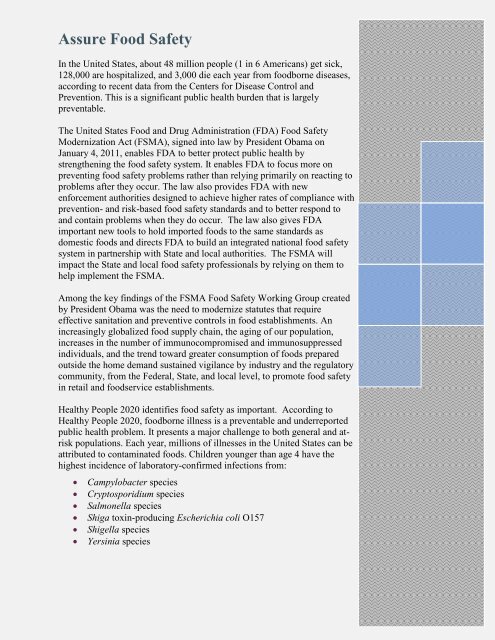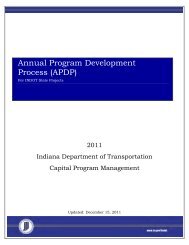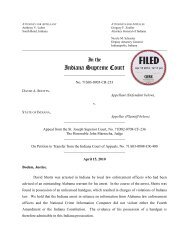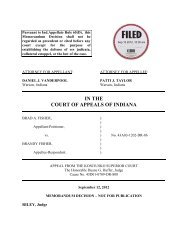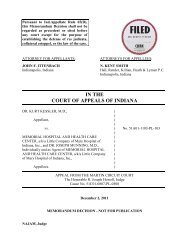Indiana State Health Improvement Plan (I-SHIP) - State of Indiana
Indiana State Health Improvement Plan (I-SHIP) - State of Indiana
Indiana State Health Improvement Plan (I-SHIP) - State of Indiana
Create successful ePaper yourself
Turn your PDF publications into a flip-book with our unique Google optimized e-Paper software.
Assure Food Safety<br />
In the United <strong>State</strong>s, about 48 million people (1 in 6 Americans) get sick,<br />
128,000 are hospitalized, and 3,000 die each year from foodborne diseases,<br />
according to recent data from the Centers for Disease Control and<br />
Prevention. This is a significant public health burden that is largely<br />
preventable.<br />
The United <strong>State</strong>s Food and Drug Administration (FDA) Food Safety<br />
Modernization Act (FSMA), signed into law by President Obama on<br />
January 4, 2011, enables FDA to better protect public health by<br />
strengthening the food safety system. It enables FDA to focus more on<br />
preventing food safety problems rather than relying primarily on reacting to<br />
problems after they occur. The law also provides FDA with new<br />
enforcement authorities designed to achieve higher rates <strong>of</strong> compliance with<br />
prevention- and risk-based food safety standards and to better respond to<br />
and contain problems when they do occur. The law also gives FDA<br />
important new tools to hold imported foods to the same standards as<br />
domestic foods and directs FDA to build an integrated national food safety<br />
system in partnership with <strong>State</strong> and local authorities. The FSMA will<br />
impact the <strong>State</strong> and local food safety pr<strong>of</strong>essionals by relying on them to<br />
help implement the FSMA.<br />
Among the key findings <strong>of</strong> the FSMA Food Safety Working Group created<br />
by President Obama was the need to modernize statutes that require<br />
effective sanitation and preventive controls in food establishments. An<br />
increasingly globalized food supply chain, the aging <strong>of</strong> our population,<br />
increases in the number <strong>of</strong> immunocompromised and immunosuppressed<br />
individuals, and the trend toward greater consumption <strong>of</strong> foods prepared<br />
outside the home demand sustained vigilance by industry and the regulatory<br />
community, from the Federal, <strong>State</strong>, and local level, to promote food safety<br />
in retail and foodservice establishments.<br />
<strong>Health</strong>y People 2020 identifies food safety as important. According to<br />
<strong>Health</strong>y People 2020, foodborne illness is a preventable and underreported<br />
public health problem. It presents a major challenge to both general and atrisk<br />
populations. Each year, millions <strong>of</strong> illnesses in the United <strong>State</strong>s can be<br />
attributed to contaminated foods. Children younger than age 4 have the<br />
highest incidence <strong>of</strong> laboratory-confirmed infections from:<br />
� Campylobacter species<br />
� Cryptosporidium species<br />
� Salmonella species<br />
� Shiga toxin-producing Escherichia coli O157<br />
� Shigella species<br />
� Yersinia species


